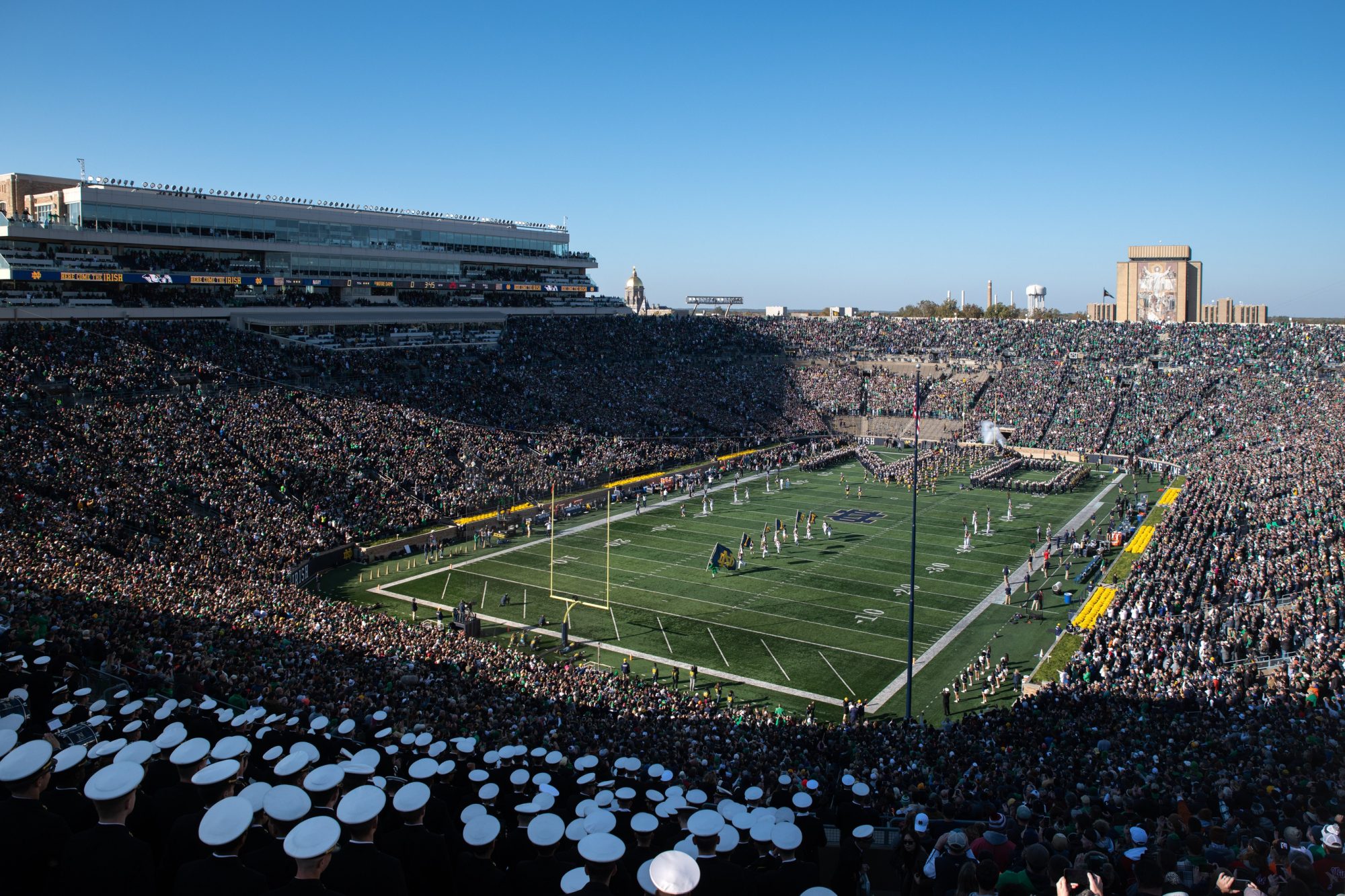College football fell into another wave of major conference realignment chaos this summer, but there was one constant: Notre Dame’s standing as an independent, something dating to 1887.
Depending on one’s view, that strategy could be seen as refreshingly pure or foolishly anachronistic. But no such debate exists in South Bend, Indiana — the Fighting Irish are content with the hand they’ve played, and they’re sticking with it.
“We haven’t flinched and still adopt the same stance as [an] independent, and what we need to continue to be so,” Aaron Horvath, Notre Dame’s senior associate athletics director, told Front Office Sports.
That attitude will again be on full display when Notre Dame — currently ranked No. 13 in the preseason AP Top 25 Poll as well as the Coaches Poll — begins college football’s Week 0 with a game against Navy in Dublin on Saturday in a contest originally postponed by the pandemic. Kickoff is scheduled for 2:30 p.m. ET on NBC.
“I think Notre Dame is in a prime position — because of their independence,” Jon Miller, NBC Sports president of acquisitions and partnerships, told Front Office Sports. “They stand above the fray, and they are uniquely positioned to remain independent. And they have shown they can perform at a very high level as an independent, even in the face of confusing alliances and conference setups.”
Three-Part Test
Notre Dame has long employed a three-part strategy to remain independent in football: having a committed broadcast partner, a pathway providing “adequate access” to the College Football Playoff, and a “sensible” home for the school’s Olympic sports, particularly relating to travel.
So far, even amid the massive, football-driven changes this summer for the Big Ten, Big 12, and Pac-12 conferences — and perhaps still the ACC — the Fighting Irish keep passing those tests.
NBC Sports will show seven Notre Dame games this season as part of a broadcast contract for an estimated $22 million annually through 2025, continuing a relationship between the two that started in 1991.
That media relationship has also been buttressed on the sponsorship and licensing fronts with a series of pacts with major brands such as DirecTV and Under Armour, which recently signed the richest-ever licensing pact in college football.
Notre Dame has been in the CFP twice in the event’s nine-season history and narrowly missed on one other occasion, though they arguably would have appeared in more with a tougher, major conference schedule.
The team’s 2023 schedule includes games against Ohio State, USC, and Clemson — all currently ranked in the top 10 — providing large-scale opportunities to impress voters — though other games with Tennessee State and Central Michigan hold less cachet. The CFP, meanwhile, will expand to 12 teams in 2024, though with a still-uncertain selection format.
Outside men’s hockey, which competes in the Big Ten, all of Notre Dame’s other sports play in the ACC.
“I think all of this dynamic has just reinforced that a lot of decisions that have been made over the years have placed Notre Dame in a very good position,” said Jack Swarbrick, Notre Dame athletic director, after USC and UCLA joined the Big Ten.
But on Wednesday, Swarbrick had sharp words for the latest realignment moves, which expand the geographic footprints of the Big Ten and Big 12. “[It’s] a complete disaster,” he said on “The Dan Patrick Show.”
“Everybody in the industry has to take responsibility here. I’m not excluding myself from that. I think the decision-making has lost its way in terms of the focus on the student-athlete and what’s primarily best for them. But we are where we are, and we have to try and make it work,” he said.
Part of making it work, in Swarbrick’s mind, is potentially seeing Stanford and Cal join the ACC, as he said of the two, “you can’t have two great academic institutions not have a place to play.”
Such an entry and the resulting trips from Indiana to California, however, would exacerbate the travel issues and student-athlete wellness that Swarbrick is attempting to keep in mind.
Executive Changes
In the position since 2008, Swarbrick will retire early next year and turn the program’s reins over to Pete Bevacqua, formerly NBC Sports chairman and a Notre Dame alumnus.
Bevacqua — currently advising Swarbrick in a planned transition period — extends a growing trend of programs hiring media executives to navigate the fast-changing business of college sports and television dollars at the heart of the latest swirl of conference realignments.
But it also will create a somewhat unique and perhaps awkward situation in which Bevacqua will soon be negotiating a potential renewal deal with his former network colleagues.
Notre Dame has already signaled that it wants to triple its current rights fees in the next deal.
“All the signs point to us trying to continue this relationship,” Miller said. “Having Pete there is kind of a double-edged sword. Pete obviously knows all the assets here and the things that NBC brings to the table. We also understand how Notre Dame has helped us … and this relationship goes far beyond just the seven football games [per year].
“So we’re intent on finding a way to get something done that both sides will be happy with,” Miller said.
Whether that happiness will continue to include football independence might take more than the luck of the Irish.



![[Subscription Customers Only] Jun 15, 2025; Seattle, Washington, USA; Botafogo owner John Textor inside the stadium before the match during a group stage match of the 2025 FIFA Club World Cup at Lumen Field.](https://frontofficesports.com/wp-content/uploads/2026/02/USATSI_26465842_168416386_lowres-scaled.jpg?quality=100&w=1024)

![[Subscription Customers Only] Jul 13, 2025; East Rutherford, New Jersey, USA; Chelsea FC midfielder Cole Palmer (10) celebrates winning the final of the 2025 FIFA Club World Cup at MetLife Stadium](https://frontofficesports.com/wp-content/uploads/2026/02/USATSI_26636703-scaled-e1770932227605.jpg?quality=100&w=1024)











